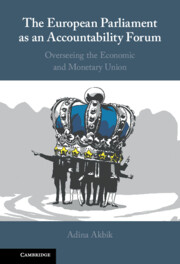Acknowledgements
In many ways, this book feels like my second PhD thesis. Similar to my dissertation, I conducted the research and completed the writing within four years in a wonderful academic environment: (this time) the Hertie School of Governance in Berlin. The book is part of the wider research project LEVIATHAN – ‘Legal and Political Accountability in “Post-Crisis” EU Economic Governance’ (2017–2021) – funded by the European Research Council (ERC) in the framework of the Horizon 2020 research and innovation programme (grant agreement 716923). I am particularly grateful to Mark Dawson, the principal investigator of the project, who entrusted me to carry out one of the work packages on the subject of political accountability in relation to the European Parliament. Working with Mark in the past years has definitely been the highlight of my time as a postdoc. I learned so much from him in terms of writing and thinking about European Union (EU) governance, pushing the boundaries of my political science training into legal scholarship. Our collaborations have been both intellectually engaging and productive, and I am sure we will continue to co-author papers in the future. I consider Mark and his husband, Pierre, my good friends and we often spend time together outside the university.
More generally, the Hertie School has offered an exciting work environment in terms of both research and teaching. Despite being a small school of governance focused on graduate studies, the Hertie School has a vibrant community of people working on the EU from an academic and think tank perspective. At the Jacques Delors Centre, I appreciated our weekly European Governance Colloquiums, which always brought interesting new research to my attention. I would especially like to thank Markus Jachtenfuchs, the Director of the Centre, who has provided me with a lot of feedback over the years and has often served as a mentor regarding my future career plans. In the postdoc community, I am glad to have found Ana Bobić, Marta Migliorati, and Christian Freudlsperger, who are not only my co-authors but also my good friends and support group in case of crises of professional self-confidence – which are unavoidable in academia. On the administrative side, I would like to thank Gabi Brühl, the centre manager at the Jacques Delors Centre, who has repeatedly helped me navigate the complex waters of German bureaucracy.
Next to the ERC, which has generously funded the research behind this book, I am grateful to Cambridge University Press and Tom Randall, in particular, for a swift and helpful review process. I would also like to thank the participants of a workshop held on 8 October 2018 at the Hertie School on the subject of accountability of the European Central Bank (ECB). This event has deepened my understanding of the oversight interactions between the European Parliament and the ECB and opened the door towards interacting with practitioners working in or with the two institutions. Special thanks to Marcel Magnus from the European Parliament’s Economic Governance Support Unit (EGOV), with whom I talked repeatedly and who has given me feedback on one of the chapters. In composing the data sets and coding the empirical material for the book, I had the help of an excellent group of research associates who contributed to the LEVIATHAN project during 2017–2020 (in chronological order): Evgenija Kroeker, Rebecca Segall, Harry McNeill Adams, Elena Bertolini, and Francesco Lanzone.
On a personal front, I know my work would not be the same without the love and stability provided by my husband, Alex. I feel extremely lucky to have him in my life for many reasons, but when it comes to my career, I am grateful for the constant support and encouragement to persevere. On the same note, I would like to thank my parents and sister in Romania, who have always been in my corner no matter what.
To come back to my opening about PhD theses, I do have a message for all doctoral students out there struggling to define or complete their dissertations: it gets easier the second time around.



